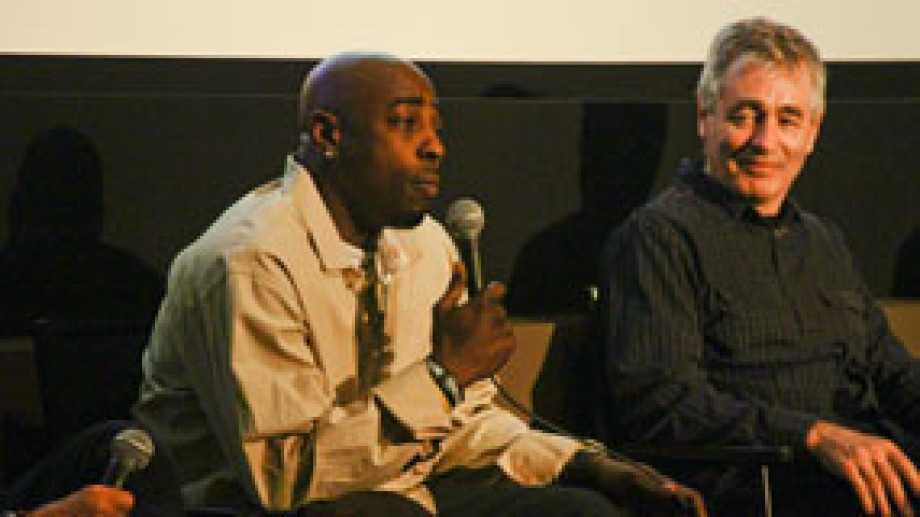
Photo by Ashley Dupree
“How’s the basketball movie coming?” Richard Peña would regularly ask production company Kartemquin Films in the early nineties. One day, after a few years of fruitless inquiries, Peña got a call: “We've got something to show you,” they said. A year later, “the basketball movie” played as the closing night film of the 32nd New York Film Festival. It received one of the longest standing ovations in the festival's history.
Unlike its subjects—high school basketball players and NBA hopefuls Arthur Agee and William Gates—Hoop Dreams (NYFF '94) had a straight and unobstructed rise to glory. Last week's 50 Years of the New York Film Festival screening reminded us why. Hoop Dreams is one of the most empathetic, emotionally devastating documentaries in the history of the medium, but it also did what every well-intention doc dreams of: it changed lives. NBA all-star Baron Davis of the New York Knicks, relegated by a pair of crutches to the entranceway of the Francesca Beale Theater, recalled during his introduction how the film inspired his rise to stardom: when his coach screened the film after practice, Davis gave it his own standing ovation—out of an audience of four.
Last night felt like a victory lap, a chance for filmmakers Steve James, Frederick Marx, and Peter Gilbert to feel proud once more of their stunning creation. During the lengthy post-screening Q&A, the trio discussed their painstaking editing process (a three-year ordeal involving 250 hours of footage and painstaking VHS transfers) and their legal battles with Chicago private school St. Joe's, of which the film offers a not-so-flattering portrait.

Photo by Ashley Dupree
Yet this was more than a chance for three very talented filmmakers to rest on their laurels. Present also was Arthur Agee himself, who called the film both “a blessing and a curse.” It’s easy to see why 14-year old Arthur might have been apprehensive about having three middle-class white men following him around a low-income, predominantly black neighborhood, cameras in hand. The discussion quickly turned to what James called “the 64 thousand-dollar documentary question”: whether or not the presence of the camera changes the behavior of its subjects. But somehow the answer feels less significant than the situation which prompted it—for Arthur, the camera was a fact of life, always there, documenting success and failure alike, moments of togetherness and of tragedy. It's jarring to see the man in person after watching his most intimate moments onscreen for nearly three hours. Suddenly, he's more than just a subject.
For better or for worse, Hoop Dreams has informed far more of Arthur’s life than what we see onscreen. Thankfully, it seems to be largely for the better. Arthur now uses the film to encourage NBA-hopefuls like his younger self to stay in school, while still pursuing their dreams of stardom. “I don’t want to crush any kid's dreams,” Arthur tells the crowd. He knows what it’s like to be that kid who invests everything in a single, all-consuming vision, but he also knows now that the investment doesn't always get returned. One audience member asks if the film is meant to inspire or deter. “Inspire,” Arthur answers unreservedly. But inspire pragmatically.
Arthur didn’t make the NBA, nor did William (now a pastor). But basketball still earned both college scholarships. It still gave them the promise of a better life, a life free of drug-pushers and domestic breakdowns and financial woes. Their mothers helped, of course: both brave, determined women who fought unceasingly to better their lives and their sons'. And maybe Hoop Dreams helped too—it's nice to think, anyway, that the camera's presence motivated these young men to aim higher than the people around them. It made them different, but it also made them special. Arthur recalls having to defend himself to the dealers on the basketball court, who looked suspiciously at the cameras trailing the then-high-schooler: “I’m not saying I’m better than you…” He pauses. “But I want to be.”
Watch full video of the Q&A below:
Our 50 Years of the New York Film Festival series is counting down to the landmark 50th edition of the fest with screenings of films from every previous NYFF. Next up is Tuesday's screening of Gianni Amelio's Lamerica (NYFF '95), a perfect companion to our Open Roads: New Italian Cinema series. And watch out for future offerings from the likes of Olivier Assayas, Abbas Kiarostami, Mike Leigh, and Terence Davies!



